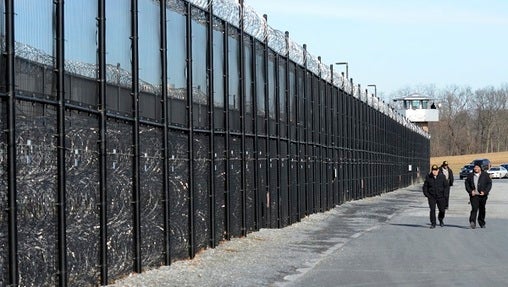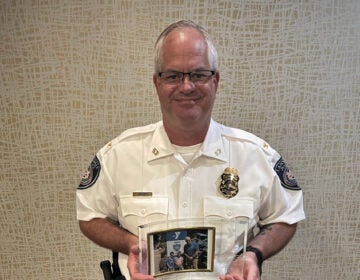Pa. touted as criminal justice reform model, but officials say there’s more to do
As Washington lawmakers debate a proposal to ease harsh federal sentencing guidelines, Pennsylvania is being cited as a role model.

Corrections officers arrive for a shift at the State Correctional Institution at Camp Hill, Pennsylvania. (Marc Levy/AP Photo)
As lawmakers in Washington debate a proposal to ease harsh federal sentencing guidelines and shorten some prison terms, Pennsylvania is being cited as a role model.
On Tuesday, Governor Tom Wolf and other state officials were featured in a Washington Post discussion on national corrections reform. But while they’re being presented as a state headed in the right direction, those officials say the commonwealth still has a long way to go.
In June, Pennsylvania passed Act 56 — a so-called “clean slate” law that seals most nonviolent misdemeanor convictions after a decade, and lets onetime inmates petition to seal other records.
Sponsored by Cumberland County Representative Sheryl Delozier, a Republican, the bill was a bipartisan achievement — the first such law in the country, and a perfect example of what Wolf, state Corrections Secretary John Wetzel, and other lawmakers want for the prison system.
As Wetzel put it on the panel, “Citizens don’t benefit from putting a scarlet letter on someone for committing a crime.”
But in other areas, that scarlet letter remains.
Pennsylvania has among the most people on probation and parole in the country, and so far, efforts to ease the laws that keep them there have failed.
The commonwealth also hands out more life-without-parole sentences than any other state.
Wolf said those things don’t help anyone.
“We need to do everything we can to get people back into the economy, back into family life, back into our communities,” he said.
He added, “I think what we need to stop doing is conflating being really tough on crime as something that is just going to solve all our problems. It has become an ideological thing. We need to look at the data and say, we can have a better society all around if we do this right.”
The panel noted, things are changing — pointing out criminal justice has become less partisan in the last several years.
In the next legislative session, they said, there’s a lot on the agenda that could result in more progress on the issue.
WHYY is your source for fact-based, in-depth journalism and information. As a nonprofit organization, we rely on financial support from readers like you. Please give today.





